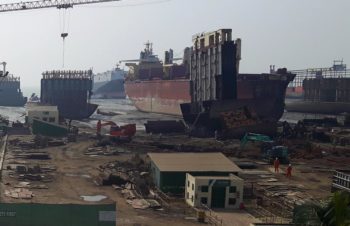
Brazilian regulators are planning to strengthen rules to prevent exporters such as Petrobras and Vale SA from selling aging ships to buyers who offload the vessels in South Asia’s controversial coastal scrapyards.
Earlier this month, authorities decided to develop a legal framework to ensure former Brazilian ships don’t end up with recyclers notorious for using dirty and dangerous methods, federal environmental watchdog Ibama said by email. Brazilian companies could face fines of as much as 10 million reais ($3.2 million) if Ibama finds they violate international standards by letting their vessels end up in substandard shipbreaking facilities in India, Pakistan and Bangladesh.
By selling ships to buyers who then send them to South Asian beaches for dismantling, the two Brazilian exporters aren’t alone. But Vale — which sold two vessels that were sent to India this year and intends to offload four more — is one of the few mining companies that still owns its fleet, while other oil producers such as Royal Dutch Shell Plc are adopting cradle-to-grave practices in which ships end up being recycled in a safer and more sustainable fashion.
‘Green’ Ships In March, Ibama began looking into the sale of a Petrobras vessel called Lobato to recyclers planning to scrap the ship in India, the agency said. That followed a complaint lodged by Brussels-based nongovernmental organization Shipbreaking Platform. Sindmar, Brazil’s maritime trade union, joined the NGO in accusing both Petrobras and Vale, the country’s largest exporters, of abusing standards set by the Basel Convention, which is meant to prevent the transport of hazardous materials to less developed countries.
Both Petroleo Brasileiro SA, as the state-controlled oil company is formally known, and Vale say they offload ships in good faith to reputable buyers. Vale, the world’s largest iron-ore miner, said it adopted a strategy this year of only selling to dealers that possess a “green ship recycling” classification, following standards established by the International Maritime Organization and the Hong Kong Convention on Ship Recycling.
For its part, Petrobras said it auctions older vessels to companies that it believes plan to operate them. It’s up to the buyers to make decisions about the ship’s final destination, the Rio de Janeiro-based company’s press department said by email.
Dangerous Chemicals The shipbreaking industry in South Asia has taken measures to clean itself up. Most of those efforts are insufficient, according to Shipbreaking Platform. The NGO describes the trade at many yards as toxic because vessels are beached at high tide, then ripped apart by workers who can be exposed to dangerous chemicals. Injury and death rates can be high and toxins sometimes leak into the sea, the group says.
Forcing Brazilian companies to monitor more carefully where their former vessels are dismantled could drive up costs. Not doing so risks fines and turning off a growing number of investors focused on environmental and social responsibility.
“What they do with ships at the end of their life does matter,” said Julie Gorte, senior vice president of sustainable investing at Pax World Management, which manages about $4.5 billion. Being associated with South Asian shipbreaking would be the type of activity that would cause her firm to engage the company and possibly rethink investments, she said by telephone.
Pax World sold its Petrobras shares as the oil company become embroiled in a graft scandal in Brazil. It hasn’t owned Vale shares for five years. “With Brazil you already have this one strike,” Gorte said. “When you add something on top, you are multiplying your reputational risk.” Source: Bloomberg
Copyright Ships & Ports Ltd. Permission to use quotations from this article is granted subject to appropriate credit given to www.shipsandports.com.ng as the source.
